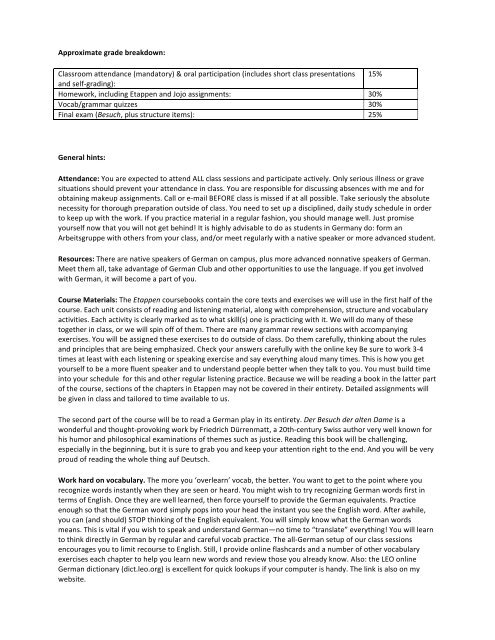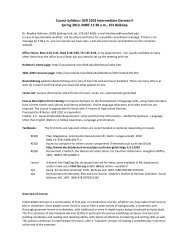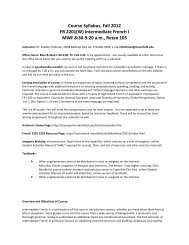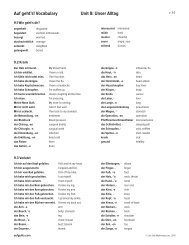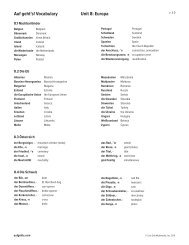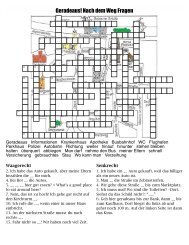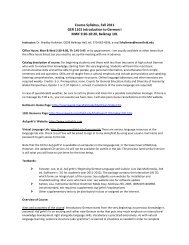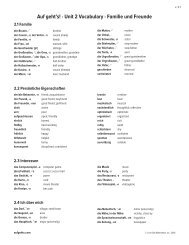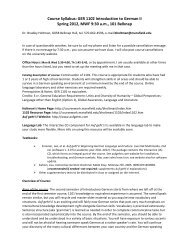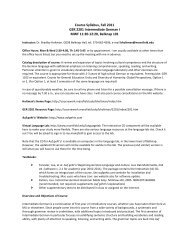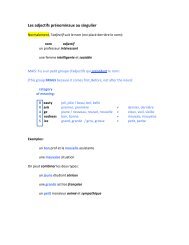Course Syllabus: GER 2202 Intermediate German II Spring 2012 ...
Course Syllabus: GER 2202 Intermediate German II Spring 2012 ...
Course Syllabus: GER 2202 Intermediate German II Spring 2012 ...
You also want an ePaper? Increase the reach of your titles
YUMPU automatically turns print PDFs into web optimized ePapers that Google loves.
Approximate grade breakdown: <br />
Classroom attendance (mandatory) & oral participation (includes short class presentations <br />
and self-‐grading): <br />
Homework, including Etappen and Jojo assignments: <br />
Vocab/grammar quizzes <br />
Final exam (Besuch, plus structure items): <br />
15% <br />
30% <br />
30% <br />
25% <br />
General hints: <br />
Attendance: You are expected to attend ALL class sessions and participate actively. Only serious illness or grave <br />
situations should prevent your attendance in class. You are responsible for discussing absences with me and for <br />
obtaining makeup assignments. Call or e-‐mail BEFORE class is missed if at all possible. Take seriously the absolute <br />
necessity for thorough preparation outside of class. You need to set up a disciplined, daily study schedule in order <br />
to keep up with the work. If you practice material in a regular fashion, you should manage well. Just promise <br />
yourself now that you will not get behind! It is highly advisable to do as students in <strong>German</strong>y do: form an <br />
Arbeitsgruppe with others from your class, and/or meet regularly with a native speaker or more advanced student. <br />
Resources: There are native speakers of <strong>German</strong> on campus, plus more advanced nonnative speakers of <strong>German</strong>. <br />
Meet them all, take advantage of <strong>German</strong> Club and other opportunities to use the language. If you get involved <br />
with <strong>German</strong>, it will become a part of you. <br />
<strong>Course</strong> Materials: The Etappen coursebooks contain the core texts and exercises we will use in the first half of the <br />
course. Each unit consists of reading and listening material, along with comprehension, structure and vocabulary <br />
activities. Each activity is clearly marked as to what skill(s) one is practicing with it. We will do many of these <br />
together in class, or we will spin off of them. There are many grammar review sections with accompanying <br />
exercises. You will be assigned these exercises to do outside of class. Do them carefully, thinking about the rules <br />
and principles that are being emphasized. Check your answers carefully with the online key Be sure to work 3-‐4 <br />
times at least with each listening or speaking exercise and say everything aloud many times. This is how you get <br />
yourself to be a more fluent speaker and to understand people better when they talk to you. You must build time <br />
into your schedule for this and other regular listening practice. Because we will be reading a book in the latter part <br />
of the course, sections of the chapters in Etappen may not be covered in their entirety. Detailed assignments will <br />
be given in class and tailored to time available to us. <br />
The second part of the course will be to read a <strong>German</strong> play in its entirety. Der Besuch der alten Dame is a <br />
wonderful and thought-‐provoking work by Friedrich Dürrenmatt, a 20th-‐century Swiss author very well known for <br />
his humor and philosophical examinations of themes such as justice. Reading this book will be challenging, <br />
especially in the beginning, but it is sure to grab you and keep your attention right to the end. And you will be very <br />
proud of reading the whole thing auf Deutsch. <br />
Work hard on vocabulary. The more you ‘overlearn’ vocab, the better. You want to get to the point where you <br />
recognize words instantly when they are seen or heard. You might wish to try recognizing <strong>German</strong> words first in <br />
terms of English. Once they are well learned, then force yourself to provide the <strong>German</strong> equivalents. Practice <br />
enough so that the <strong>German</strong> word simply pops into your head the instant you see the English word. After awhile, <br />
you can (and should) STOP thinking of the English equivalent. You will simply know what the <strong>German</strong> words <br />
means. This is vital if you wish to speak and understand <strong>German</strong>—no time to “translate” everything! You will learn <br />
to think directly in <strong>German</strong> by regular and careful vocab practice. The all-‐<strong>German</strong> setup of our class sessions <br />
encourages you to limit recourse to English. Still, I provide online flashcards and a number of other vocabulary <br />
exercises each chapter to help you learn new words and review those you already know. Also: the LEO online <br />
<strong>German</strong> dictionary (dict.leo.org) is excellent for quick lookups if your computer is handy. The link is also on my <br />
website.


